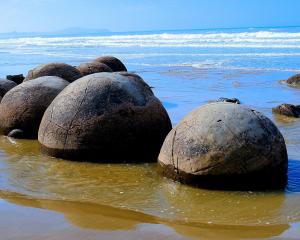Participants have converged on Oamaru and the surrounding area from Christchurch, Waimate, Dunedin, Palmerston and further afield to attend the 32 different courses offered.
The intention of the courses, which change with the seasons, is to build resilient, interconnected communities that utilise their skills and resources in a more communal, sustainable way.
Organisers Nathalie Brown and Gail May-Sherman said they hoped the district would one day be a national centre where people travelled to lean about sustainable living.
Mrs May-Sherman said she was "absolutely thrilled" with how the week had gone, adding that many tutors had expressed surprise at the number of people attending.
She said about 250 places in the courses had been filled, though she was unsure how many people had enrolled in more than one course.
More than 40 people had wanted to take Marise Martin's Herbal Delights course at Herbert and about 30 an edible seaweed class at Moeraki, held by Portobello-based marine biologist Sally Carson and restaurateur Fleur Sullivan, who prepared crushed, dried, chipped, flaked, cooked, raw and ground seaweed dishes.
Ms Brown said the best way to prepare for an uncertain economic and environmental future was to educate communities about sustainable living, rather than by threatening people with talk of peak oil and carbon emissions.
"We are finding that some people are not ready to find out about [peak oil] - I refused to believe it at first."
Margaret Jefferies, chairwoman of Project Lyttelton - an incorporated society with hundreds of members which runs a farmer's market, festivals, community gardens and other initiatives in the earthquake-ravaged Banks Peninsula town - held a course on complementary currencies at Camp Iona yesterday.
She said the earthquakes had "opened up people's thinking", which, in turn, had empowered individuals to find their own solutions to problems in a co-operative way.
She spoke of time banks, which eschewed monetary systems by converting people's time into a currency that could be traded on equal terms with other participants, and savings pools, which combined member's money into a pool from which individuals could borrow interest-free as the need arose.
About 400 people were members of Project Lyttelton's time bank, and about a dozen were involved in the savings pool, she said. A fundraising dinner for about 25 people will be held at Camp Iona tonight, with proceeds going to the community garden.
Many of the courses will be repeated, with additional teachers and administrators sought for the Autumn courses from April 14-22.











